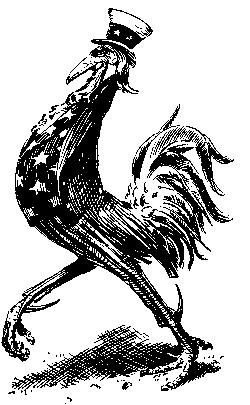
I prefer "damnation bow-wows," myself.
Dear Evan: After hunting through the sources in our library, and asking several people, someone finally told me that you would be the one to answer my question if anyone could. All I want to know is what is the source or background of the phrase "going to hell in a handbasket." I didn't think it would be so tough to discover but it's got me stumped so I now bring my quest to you. Thanks for any assistance -- C.C., via the Internet.
Dear Evan: Can you tell me the origin of the phrase
"to hell in a handbasket"? -- K. Greenstein, via the Internet.

Hmmm. Before we get down to business, I'd like to point out that there is a sort of "meta-question" raised by the fact that I received both of these questions with a week of each other. This sort of coincidence always makes me wonder whether I've missed some major cultural event that put a particular phrase on the tip of our collective national tongue. If anyone out there has heard a high-profile use of "going to hell in a handbasket" recently, please drop me a line so I can stop wondering (unless it has something to do with Beavis and Butthead, in which case I'd rather not know).
Clues to the origin of "going to hell in a handbasket," meaning "deteriorating rapidly or utterly," are, unfortunately, scarce as hens' teeth. The eminent slang historian Eric Partridge, in his "Dictionary of Catchphrases," dates the term to the early 1920's. Christine Ammer, in her "Have A Nice Day -- No Problem," a dictionary of cliches, agrees that the phrase probably dates to the early 20th century, and notes that the alliteration of "hell" and "handbasket" probably contributed to the popularity of the saying. Ms. Ammer goes a bit further and ventures that, since handbaskets are "light and easily conveyed," the term "means going to hell easily and rapidly." That seems a bit of a stretch to me, but I do think the addition of "in a handbasket" (or "in a bucket," as one variant puts it) does sound more dire and hopeless than simply "going to hell."
Dear Mr. Morris: My significant other and I are
having a discussion about the meaning and etymology of the
word ''idiosyncrasy.'' Can you offer some insight into this? I
was attempting to explain what I felt the word meant by
breaking it down into its root parts. These seemed to me to
be "idio," meaning one's individual self, and "sync," meaning
coordinated or meshing (as in synchronous computer
communications or synchronized swimming, etc.). -- Mark
Chatterton, via the Internet.

Far be it from my place to buck the tide of social progress as reflected in the sometimes murky mirror of our language, but I simply must take this opportunity to note that the term "significant other" has always given me the significant wimwams. Aside from the somewhat tepid connotations of "significant" in a romantic context ("Marry me, darling. You're significant to me."), every time I hear the phrase I wonder whether I've fallen in with someone harboring multiple personalities ("Well, yes, there are many of me, but Sybil is my most significant other.").
Now that I've put a dent in your relationship with your sweetie, please accept my congratulations -- you are definitely on the right track about "idiosyncrasy." The Greek root "idio" does indeed mean "of a particular person" or "personal," and crops up in many other English words, such as "idiom" ("one's own way of speaking"). "Idiot" comes from the same Greek root, originally meaning "common man," and only later coming to mean "ignorant."
You're essentially right about the "sync" part, too. The Greek root was "synkrasis," meaning "a blending or mixture," or, as you put it, a "meshing." Put all the pieces together, and we have "idiosyncrasy" meaning "an individual's mixture of personal characteristics."
Incidentally, "idiosyncrasy" is one of those rare English words whose modern sense corresponds almost precisely to the combined meanings of its ancient roots. Language almost never operates in such an orderly fashion, and it is far more common to find that the roots of a word bear only a tangential logical relation to its current meaning.
Dear Evan: My mother would say "It's Katie bar the door!" to describe someone's getting very angry. A man at the office suggested that pubs' doors were barred at closing time (or would you bar it to let no troublemakers in or out?). Any information on this one would be fun. -- Anne Ruthven, Bandera, Texas.
I hope you have a flexible definition of "fun,"
because, after searching through a dozen reference books, I
have come up with only a sketchy answer to your question.
I can tell you that "Katie bar the door" is a colloquial
expression meaning "look out" or "get ready for trouble,"
and that it is heard primarily in the Southern United States.
Beyond that, things get very murky. I even searched the
Internet for an answer, but all I discovered about "Katie bar
the door" on the Net is that the phrase may or may not --
opinions vary -- occur in the lyrics to an old REM song.

Eventually, like Dorothy in The Wizard of Oz, I realized that the best answer I was likely to find was in my own back yard all along. My parents, in their Morris Dictionary of Word and Phrase Origins, report similar difficulty in tracing "Katie bar the door." In their case however, a helpful reader came to the rescue and noted that the phrase most probably came from an old English folk song. In the song, Katie and her husband are arguing, and somehow agree that the next one to speak will lose the argument. Since neither will speak to suggest barring the door at bedtime, robbers break in during the night and commit various outrages against the pair. The end of the song apparently involves the husband crying out at last and repelling the miscreants, thereby losing the argument with his wife. Since I don't have the actual lyrics to the song, I can only presume that the phrase "Katie bar the door" occurs as a refrain or concluding stanza, but the accepted meaning of the phrase certainly fits the story conveyed in the song.
Dear Evan: I have been puzzled by a phrase that I have heard a few times. However, I am not sure whether the phrase should be "for all intensive purposes" or "for all intents and purposes." I would appreciate your help in clarifying this concern. -- K.T., via the Internet.
Hey kids, it's Mondegreen Time! Don't look at me
that way -- I'll explain in a moment. First, I should note that
K.T. sent me another e-mail message just minutes after (his?
her?) first, explaining that the matter was resolved and that
(he? she?) had determined that the phrase was, of course,
"for all intents and purposes."

So why am I persisting in answering this question? First, because it's a remarkably common question, and, second, because it's a good example of what we word mechanics call a "mondegreen," or a mishearing of a popular phrase or song lyric. The term "mondegreen" was invented by the writer Sylvia Wright in 1954, and for an explanation of the circumstances, we turn to Mr. Mondegreen himself, columnist Jon Carroll of the San Francisco Chronicle, who has made it his personal crusade to popularize the care and feeding of mondegreens:
"As a child [Sylvia Wright] had heard the Scottish ballad ''The Bonny Earl of Murray" and had believed that one stanza went like this: Ye Highlands and Ye Lowlands, Oh where hae you been?, They hae slay the Earl of Murray, And Lady Mondegreen.
"Poor Lady Mondegreen, thought Sylvia Wright. A tragic heroine dying with her liege; how poetic. When it turned out, some years later, that what they had actually done was slay the Earl of Murray and lay him on the green, Wright was so distraught by the sudden disappearance of her heroine that she memorialized her with a neologism."
Probably the all-time best-known mondegreen is the classic "Gladly the Cross-Eyed Bear" (from the old hymn "Gladly the Cross I'd Bear"), but both popular idioms and rock music lyrics are mother lodes of the critters. Given the right circumstances (inattention, lack of sleep, too many Twinkies), who among us is not capable of hearing "it's a doggy-dog world" (dog-eat-dog), or concluding that Bob Dylan's lyrics were even stranger than we thought: "Dead ants are my friends, they're blowin' in the wind."?
Marge and Tina, meet Richard Stans.
A few days ago, I took the occasion of a reader's
query about "for all intensive purposes" (which is, of course,
a mangled rendition of "for all intents and purposes") to
introduce the subject of "mondegreens." Mondegreens are
humorous mishearings of popular phrases and song lyrics,
so-named by writer Sylvia Wright in 1954. She had heard
one stanza of the Scottish ballad ''The Bonny Earl of
Murray" as "Ye Highlands and Ye Lowlands, Oh where hae
you been?, They hae slay the Earl of Murray, And Lady
Mondegreen," and only much later realized that the last line
was actually "And laid him on the green." No Lady
Mondegreen. Oops, or, as Emily Littella would say, "Never
mind."

Mondegreens vary in intensity, as you might expect, and some are a bit difficult to swallow. Mondegreen maven Jon Carroll, a columnist with the San Francisco Chronicle, recounts a mishearing of the U.S. Pledge of Allegiance that must be at least partly apocryphal: "I pledge a lesion to the flag, of the United State of America, and to the republic for Richard Stans, one naked individual, with liver tea and just this for all." But entirely believable (to me, anyway) is one of Carroll's readers mishearing the tedious anthem from "Evita" as "Don't cry for me, Marge and Tina," or another reader's puzzlement over Rod Stewart's insistence that "Every picture tells a story doughnut." My personal favorite among Jon Carroll's mondegreen crop comes from the reader who "recounted the story of the pet shop clerk who told him, in all seriousness, that her parents' wealth did them no good at all because they just sat around their backyard deck in Marin [County, California] and 'drank themselves to Bolivia.'" Sounds like fun.
But now it's time to fess up to my own mondegreen fiasco. Several years ago I devoted an entire column to the word "noisome" (meaning "obnoxious"). I used as my angle the classic Kinks song "Superman," wherein the protagonist laments, "Looked in the mirror/what did I see?/a noisome weakling/with knobbly knees" Except that he doesn't, in fact, say "noisome." As a helpful reader later pointed out, the actual words are (referring to the British system of measuring weight) "nine stone," or about 126 pounds. Oops. Never mind.
Dear Evan: Okay...so my office gets off on weird questions sometimes. We are currently in a debate about the origin of the phrase "to draw a line in the sand" (and to dare or invite someone to cross it). So...where did this phrase originate? -- Pat Nolan, via the Internet.
Well, it definitely beats arguing over paper clips. The
most recent use of the phrase "draw a line in the sand" was,
of course, by President George Bush at the beginning of the
Gulf War. But for the true clue as to the origin of the
phrase, we turn to my esteemed colleague William Safire,
whom I especially esteem when he does my work for me. In
his book "In Love With Norma Loquendi" (a collection of
his Sunday New York Times Magazine columns, published
by Random House in 1994), Mr. Safire provides two
possible origins for "drawing a line in the sand."

The more recent possible origin for the phrase is an incident said to have taken place during the siege of the Alamo in 1836, when William Barret Travis drew a line in the sand with his sword and urged those willing to stay and defend the fort to step across it. Unfortunately, this heroic story seems to have been invented by a 19th century promoter long after the fall of the Alamo. But the myth itself probably greatly popularized the phrase, so it does count as an origin of sorts even if the incident itself was apocryphal.
Another possible origin dates back to the time of the Roman Empire. It seems that one of the Macedonian kings, a bit short of cash, decided to invade Egypt, then a Roman protectorate. His army was met at the border by a lone Roman senator named Popillius Laenas, who ordered the king to withdraw. The king began to stall for time, so Popillius Laenas drew a circle in the sand around the king and demanded that the king agree to withdraw his army before he stepped out of the circle. The king, apparently impressed by the senator's nerve (or, more likely, by the Roman Empire in general), withdrew. Incidentally, not only is this account verified by contemporary historians, but it also may be the only known instance of a line drawn in the sand actually stopping someone.
Take me back to the main Word Detective page.
Take me to the Index of back columns.
All contents Copyright © 1997 by Evan Morris.